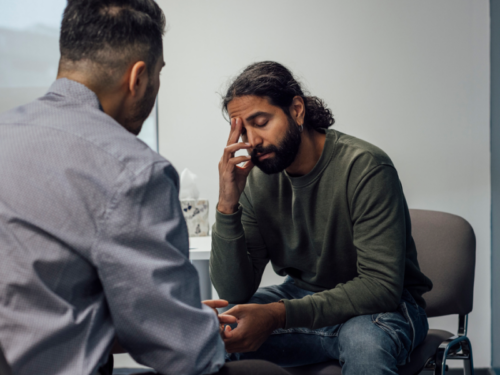
Table of Contents
A Psychiatrist Explains the Best Medications for Anxiety, Depression, and ADHD

Written By: Ashley Laderer

Clinically Reviewed By: Bree Williams
July 28, 2025
8 min.
Are you struggling with symptoms of anxiety, depression, and ADHD and wondering the best medications for treatment? Read on to learn more from a psychiatrist.
Learn more about our Clinical Review Process
Table of Contents
Living with an anxiety disorder, major depressive disorder, or attention-deficit/hyperactivity disorder (ADHD) can feel overwhelming — and dealing with all three at once is a whole different level of overwhelm. If you struggle with a combination of these conditions, the mix of symptoms can feel debilitating, getting in the way of your functioning in all aspects of life.
The majority of adults with ADHD (70%) struggle with another mental health condition, with anxiety and depression being the most common, data shows. Also, up to 50% of adults with ADHD have an anxiety disorder, and as many as 53.3% deal with depression.
When dealing with co-occurring disorders like this, you need a customized treatment plan to address all of your symptoms, but what is the best medication for anxiety, depression, and ADHD? The answer isn’t so simple. Keep reading to learn what you need to know about treating comorbid anxiety, depression, and ADHD.

Struggling with anxiety, depression, and ADHD?
Charlie Health’s virtual programs offer personalized therapy and medication management to help you recover—no matter what you’re going through.
What is the best medication for anxiety, depression, and ADHD?
“There is no single ‘best’ medication for any specific disorder or combinations of disorders,” says Dr. Mary Scoigletti, DNP, APRN, PMHNP-BC, Director of Advanced Psychiatry Providers at Charlie Health. “Treatment must be personalized, and this approach is firmly grounded in evidence-based medicine.”
Psychiatric treatment tends to be more straightforward when someone has just one diagnosis, such as standalone anxiety, depression, or ADHD. However, when there are two or more co-occurring disorders, a mental health provider has to take various things into account. For many, it’s a relief to finally have their overlapping struggles taken seriously. “Response to medications for ADHD, depression, and anxiety — especially when co-occurring — is highly variable and often requires a trial-and-error approach guided by measurement-based care,” Dr. Scoigletti says.
This is why it’s so important to work with trained, qualified mental health care professionals who can accurately diagnose and treat you.
Considerations when treating comorbid anxiety, depression, and ADHD
Finding the right treatment for multiple co-occurring disorders isn’t as simple as matching a medication to each diagnosis. Here’s what makes devising a treatment plan for anxiety, depression, and ADHD so nuanced:
1. Potential for diagnostic confusion
At face value, these three disorders seem very different. But, upon taking a closer look, there is some overlap between the three. This can sometimes make it trickier for a provider to determine the cause. “Inattention can stem from depression, anxiety, or ADHD, but the causes and treatment differ,” Dr. Scoigletti says. “Also, fatigue, poor motivation, restlessness, and irritability can occur in all three disorders, which complicates accurate diagnosis.”
2. Treatment for one condition might worsen another
“A medication beneficial for one condition may exacerbate another if not chosen carefully.” Dr. Scoigletti explains. “For example, ADHD stimulants may improve focus but increase anxiety in some people.” Or, an antidepressant could help both anxiety and depression symptoms, but leave ADHD symptoms unaddressed and even lead to cognitive dulling, which can amplify ADHD symptoms like trouble concentrating, she adds.
3. Treatment timelines differ
Different medications take different amounts of time to work, which requires patience and careful monitoring. For example, some ADHD medications (stimulants) act within hours, while antidepressants may take weeks or longer to result in a clinically significant reduction of anxiety and depression symptoms, Dr. Scoigletti says.
4. Risk of side effects and drug interactions
Polypharmacy, AKA using multiple medications at once, increases your risk for side effects and drug interactions, Dr. Scoigletti says. For example, you might be at higher risk for sedation or gastrointestinal upset.
5. Complex treatment prioritization
A provider will likely prioritize one or two of the three disorders. For instance, if ADHD symptoms are interfering most with daily life, that may become the starting point for treatment. “Clinicians must decide — which disorder is most impairing? Do we treat ADHD first to improve functioning, or stabilize mood and anxiety to reduce stimulant side effects?” Dr. Scoigletti explains. Keep in mind, there is no one-size-fits-all medication or best treatment order for these disorders, she adds.
Understanding anxiety, depression, and ADHD medications
Before diving into treatment modalities for treating co-occurring disorders, it’s important to understand which medications are typically used to treat each separate disorder.
Anxiety medications
Depression medications
ADHD medications
First-line anxiety treatments usually include SSRIs and SNRIs, while other options like buspirone, hydroxyzine, and short-term benzodiazepines may be used depending on the symptoms.
First-line treatments for depression include SSRIs, SNRIs, and sometimes bupropion, with other options like tricyclics, tetracyclics, or mood stabilizers used if those aren’t effective.
Stimulants are the first-line treatment for ADHD, but non-stimulant options like certain antidepressants and alpha-2 agonists may be used for people at risk of substance misuse.
Anxiety medications:
- First-line treatments: Antidepressants from two different drug classes — selective serotonin reuptake inhibitors (SSRIs) and serotonin and norepinephrine reuptake inhibitors (SNRIs) — are typically the first-line options for treating anxiety disorders, Dr. Scoigletti says.
- Other treatment options: Other FDA-approved anxiety medications that are second-line treatments include buspirone (BuSpar) and hydroxyzine. Additionally, sedative drugs called benzodiazepines are prescribed to people with acute severe anxiety and panic attacks. However, benzodiazepines are a type of anxiety medication that should not be used long-term, due to a risk of dependence, says Dr. Scoigletti.
Depression medications:
- First-line treatments: Selective serotonin reuptake inhibitors (SSRIs) and serotonin and norepinephrine reuptake inhibitors (SNRIs) are first-line treatments for depression, too. Some guidelines list bupropion (Wellbutrin) as a first-line option, as well.
- Other treatment options: If someone doesn’t respond adequately to first-line treatments, a mental healthcare provider might prescribe a different class of antidepressant (such as tricyclic antidepressants or tetracyclic antidepressants) or add on a different type of medication, such as a mood stabilizer like lamotrigine (Lamictal).
ADHD medications:
- First-line treatments: Stimulants are the typical first-line treatment for ADHD, Dr. Scoigletti says. However, they may not be a good fit for everyone, such as people with a history of substance use disorder, since stimulants have a high potential for abuse.
- Other treatment options: There are many non-stimulant medications, including certain antidepressants and former antihypertensive drugs, known as alpha-2 agonists.
Different treatment approaches for co-occurring anxiety, depression, and ADHD
So, how does a mental health care provider decide what treatment approach to take? It depends on which disorder is causing the most severe and impairing symptoms.
Treating primary ADHD with comorbid anxiety and depression
If ADHD is your primary concern, a common approach is to start by treating ADHD symptoms (typically with a stimulant) and then monitoring anxiety and depression closely.
“ADHD treatment can improve overall functioning, which may secondarily reduce anxiety and depression — but if mood worsens or doesn’t improve, you address it directly,” Dr. Scoigletti says. In this case, you might add an SSRI or SNRI antidepressant on top of the ADHD medication.
Many providers also stress the importance of starting low and going slow — meaning starting out at a low dose of a stimulant and increasing the dose very slowly while also monitoring for side effects. “Non-stimulants may be preferred if anxiety is severe or stimulants aren’t tolerated,” Dr. Scoigletti adds.
Treating primary anxiety or depression with comorbid ADHD
When anxiety and/or depression prevail, it’s typically best to start with a first-line treatment of an SSRI or SNRI, delaying ADHD treatment until anxiety and mood stabilize, Dr. Scoigletti says. “SSRIs may initially worsen anxiety or cause activation, so titration needs to be slow. You wait before adding a stimulant, which could further increase restlessness or anxiety,” she adds.
Once you see the results from the SSRI or SNRI reducing anxiety and depression symptoms, an ADHD medication (either a stimulant or a non-stimulant) can be added on. Since stimulant medications might worsen anxiety symptoms, people with anxiety disorders and ADHD might opt for non-stimulants.
Treating comorbid severe ADHD, anxiety, and depression
When all three conditions — ADHD, anxiety, and depression — are severe and significantly impacting daily functioning, treatment often requires a different approach. Every situation is different, and different prescribers may have different methods to treat the three. However, Dr. Scoigletti says it’s helpful to use medications with cross-symptom coverage, often in combination. Dr. Scoigletti notes the following common combinations:
- Option one: Bupropion (Wellbutrin), which is technically an antidepressant, can cover all three disorders. However, bupropion can be activating and might worsen anxiety in some people.
- Option two: Atomoxetine (Strattera) with an SSRI or SNRI. Atomoxetine is a non-stimulant ADHD medication, which means it has less potential for increased anxiety. Plus, it’s sometimes used off-label for depression.
- Option three: Guanfacine XR (Intuniv) or Clonidine XR (Kapvay) with an SSRI or SNRI. Guanfacine and clonidine are both non-stimulant ADHD medications, but they can also be used off-label to help insomnia and anxiety-related symptoms.
- Option four: A stimulant medication and an SSRI plus an optional alpha-agonist (guanfacine or clonidine). This combination should be carefully titrated, starting low and going slow, monitoring for worsening anxiety.

Therapy and lifestyle changes for anxiety, depression, and ADHD
While therapy and medication are foundational, your lifestyle can play a quiet but powerful role in supporting your healing. Of course, medications can make a huge difference in relieving anxiety, depression, and ADHD symptoms. However, therapy and lifestyle changes are also important to help you learn useful coping skills and promote lasting recovery.
Therapy for anxiety, depression, and ADHD
Various therapy modalities can help improve symptoms of the three disorders. Cognitive behavioral therapy (CBT) is a commonly used evidence-based therapy for all three disorders, and it often improves medication effectiveness, Dr. Scoigletti says. CBT helps you learn how your thoughts, feelings, and behaviors are interconnected. You’ll identify unhealthy and unhelpful thought patterns and learn to replace them with healthier ones.
Other helpful modalities include:
- Dialectical behavioral therapy (DBT): DBT teaches skills such as mindfulness, emotional regulation, distress tolerance, and interpersonal effectiveness. It’s very useful for people who experience emotional dysregulation and relationship difficulties.
- Acceptance and commitment therapy (ACT): ACT is an acceptance and mindfulness-based therapy that can help you learn to approach your symptoms in a new way. Rather than trying to eliminate difficult thoughts or feelings, ACT teaches you to accept them while committing to actions that align with your values.
- Executive functioning coaching or skills training: Often used alongside therapy, this type of training can help people with ADHD learn to improve their executive functioning skills, such as organization, planning, and time management.
Lifestyle changes
Mental health and physical health go hand in hand, and it’s crucial to take care of your overall well-being to feel your best mentally. On top of therapy and taking your meds as prescribed, healthy lifestyle habits can further help reduce symptoms. “Sleep, exercise, and nutrition play key roles, especially in ADHD and mood regulation,” Dr. Scoigletti says. Some other self-care tips include:
- Eating a balanced, healthy diet
- Getting 8-10 hours of sleep a night
- Exercising regularly
- Practicing mindfulness
- Avoid substances like alcohol and other illicit substances that can worsen mental health

How Charlie Health can help
If you struggle with anxiety, depression, and ADHD, Charlie Health can help. Charlie Health’s virtual Intensive Outpatient Program (IOP) provides more than once-weekly mental health treatment for individuals dealing with serious mental health conditions.
Our program incorporates evidence-based therapies, like CBT and DBT, into individual counseling, family therapy, and group sessions. We also provide psychiatric medication management, as needed, to people who can benefit from psychiatric medications. With this kind of support, recovery is possible. Fill out the form below or give us a call to start healing today.
References
https://www.frontiersin.org/journals/psychiatry/articles/10.3389/fpsyt.2025.1597559/full
https://pmc.ncbi.nlm.nih.gov/articles/PMC6340395/
https://www.ncbi.nlm.nih.gov/books/NBK609607/
https://my.clevelandclinic.org/health/treatments/11766-adhd-medication
https://www.ncbi.nlm.nih.gov/books/NBK493234/




